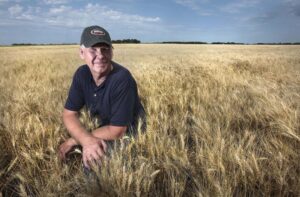Doug Martin is a 4th generation farmer on 4,000 acres of his family’s land near Selkirk, Manitoba. He operates a mixed farm, raising weanling hogs and rotating winter wheat, hard spring wheat, canola, soybeans and grain corn in the field. He is an active member of the Manitoba Crop Alliance.

Doug grows a smaller acreage of each of the crops in his rotation every year, planning for staged seeding and ripening. He can then utilize the same equipment over the entire 4,000 acres. Winter wheat goes in after the canola comes off in the fall, and is the first crop to be harvested in early August.
“We zero-till winter wheat into our canola stubble, which offers sustainable benefits. We farm in a wetter area, where tillage is still popular. We leave the stubble standing to catch the snow to insulate the sprouts to get through the winter. Winter wheat is a good crop to plant if you’re aiming to reduce tillage.”
Winter wheat has several competitive advantages both in the field and in the bin. “We rarely have to spray for weeds during the growing season. Winter wheat gets a head start – it’s a very competitive crop. And it comes off early – early market gives you good cash flow off the combine, which frees up bin space before other grains come off.”
Doug buys his Canadian Western Red Winter Wheat varieties from Robert Graf, a winter wheat breeding scientist based at AAFC Lethbridge Research and Development Centre. “I’ve been growing Wildfire, which has good winter hardiness. Once you get the wheat through the winter, you’ve got it made. Newer winter wheat varieties are getting close to hard red spring when it comes to milling quality and protein.”
Doug believes we’re on the cusp of the eco-labelling movement here in Canada—this program could be the beginning of more to come. “Winter wheat hasn’t historically been a very high value crop, so the opportunity to differentiate and add-value through an eco-label is an exciting prospect. Millers and end-users have really embraced the ecolabel and are moving it to market. Hopefully it will create demand and create more value for our winter wheat. It’s been really interesting seeing this project evolve.”
Learn more about growing winter wheat at https://www.growwinterwheat.ca/